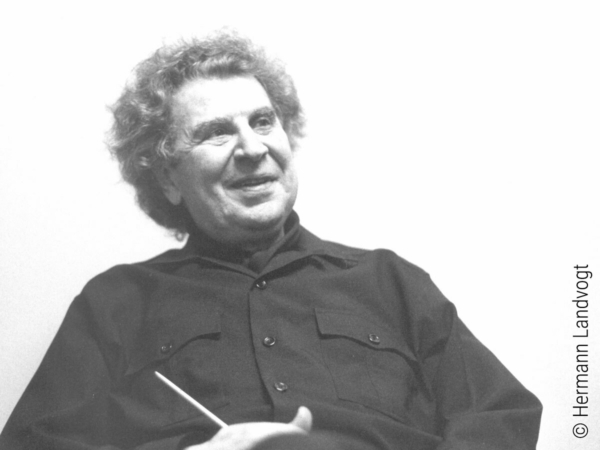Mikis Theodorakis (1925–2021)
Die Musik von Mikis Theodorakis braucht die Weite und Offenheit einer griechischen Arena, eines Theaters. Es ist eine Kunst der Agora, des Marktplatzes, wo Menschen Gedanken und Erfahrungen austauschen, in einer Sprache, die alle verstehen.
Wegen seiner Lieder, Oratorien und Filmmusiken, die auch beim deutschen Publikum viele Freunde fanden, wurde der Grieche vorschnell als „Folklorist“ eingestuft oder gar dem Bereich der Unterhaltung zugeordnet. Diesem Urteil liegt die Situation der Avantgarde-Szene zugrunde, die sich von der Volksmusik strikt getrennt hat. Nach Auffassung von Theodorakis ist diese Trennung jedoch für die Entwicklung sowohl der Musik wie des Publikums schädlich. Er selbst möchte die Spaltung von Kunstmusik und Volksmusik überwinden.
Der am 29. Juli 1925 auf der Insel Chios geborene Grieche nimmt mit wachem Bewusstsein die vielfältigen Musikformen seines Landes auf, die nach Jahrhunderten türkischer Besetzung erst um 1900 wieder zu eigenständigem Leben erwacht waren. Seine frühesten Kompositionen orientierten sich an unbegleiteten Gesangsformen der griechischen Kirchenmusik, wozu dann bald Elemente des Volksgesangs hinzutraten.
Zu den prägenden Ereignissen seiner Jugend gehörte die Okkupation durch italienische und deutsche Truppen sowie die Widerstandsbewegung, die Nationale Befreiungsfront. Der junge Theodorakis schloß sich ihrer Jugendorganisation EPON an und wurde mehrfach verhaftet. Ausgerechnet der deutsche Musikfilm „Die Neunte von Beethoven“ löste 1942 bei ihm den Wunsch zum Musikstudium aus.
Im Deportationslager auf Ikaria begann Theodorakis 1948 die Komposition seiner Ersten Sinfonie, nachdem er vom Tod eines Jugendfreundes, des Unterleutnants Makis Karlis, gehört hatte. Besessen von Schmerz irrte er in jener Nacht durch die Dunkelheit, bis ihm im Morgengrauen „die Musik mit ihrer tröstenden Liturgie“ kam. Als Vorbilder schwebten ihm griechische Tragödien, Wandgemälde sowie die „Leningrader“ Sinfonie von Schostakowitsch vor. Die Hörer sollten sich und ihre Zeit in seinem Werk wiedererkennen.
Nach der Rückkehr von Musikstudien am Pariser Konservatorium formulierte Theodorakis in Athen zusammen mit Freunden ein Programm zur Reorganisierung der griechischen Musik, das ausdrücklich auch das breite Publikum einbezog. Er schrieb große Liederzyklen und Oratorien wie „Canto General“ und „Axion Esti“, kehrte aber erst 1980 zu der für ihn bedeutendsten Musikform, zur Symphonik, zurück.
Den Ausgangspunkt seiner Symphonien Nr. 2 „Das Lied der Erde“ und Nr. 3 bildete die Dichtkunst. Der Rückgriff auf poetische Texte sollte dem Durchschnittshörer „helfen, durch Aufnehmen des Wortes und seiner Logik sich den ideellen Gehalt des Werkes zu erschließen“. Auch Franz Liszt hatte seine sinfonischen Dichtungen mit ähnlichen Volksbildungsmotiven erklärt.
(Albrecht Dümling, aus dem Booklet zu „Mikis Theodorakis - Sinfonie Nr. 3 / Liturgie Nr. 2“, CD Berlin Classics, 1995)









